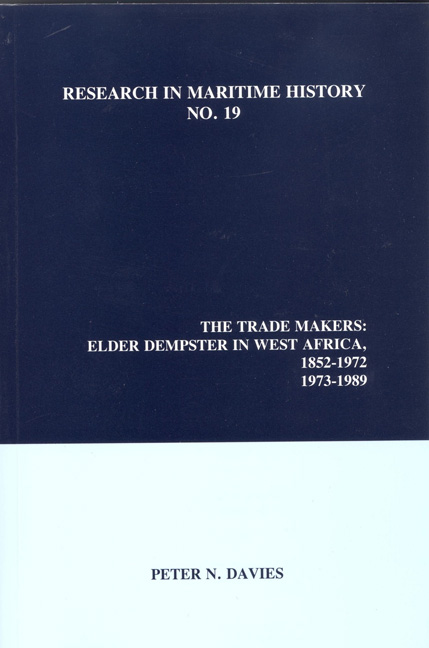Book contents
- Frontmatter
- Table of Contents
- List of Illustrations
- Foreword
- Introduction (Second Edition)
- Foreword
- Preface
- Acknowledgments
- Introduction to the Original Edition
- Frontispiece
- Part One The Pioneers
- Part Two Elder Dempster And Company
- Part Three Elder Dempster And Company Limited
- 7 Lord Kylsant
- 8 The Great War
- 9 Reconstruction and Change
- 10 The End of the Royal Mail Group
- Part Four Elder Demster Lines Limited
- Part Five The End Of An Era
- List of Appendices
- Appendices
- Bibliography
- Index
8 - The Great War
from Part Three - Elder Dempster And Company Limited
- Frontmatter
- Table of Contents
- List of Illustrations
- Foreword
- Introduction (Second Edition)
- Foreword
- Preface
- Acknowledgments
- Introduction to the Original Edition
- Frontispiece
- Part One The Pioneers
- Part Two Elder Dempster And Company
- Part Three Elder Dempster And Company Limited
- 7 Lord Kylsant
- 8 The Great War
- 9 Reconstruction and Change
- 10 The End of the Royal Mail Group
- Part Four Elder Demster Lines Limited
- Part Five The End Of An Era
- List of Appendices
- Appendices
- Bibliography
- Index
Summary
The Effect of the War on British Shipping
All shipping companies had become increasingly apprehensive as the crisis developed, and the seriousness of the position was recognised when all charters to the Black Sea were suspended after the Austrian ultimatum to Serbia on 23 July. Within a week all tramp chartering had ended, and as soon as war was declared almost all of the regular lines cancelled their sailings. Thus for a time, all ports were full of vessels awaiting instructions from their owners, and the trade of the nation was at a standstill. Fortunately, this state of affairs was not to last for very long. The arrangements made by the Navy, plus the cover provided by the rapidly organised State Insurance Scheme quickly encouraged a return to normal activity. The failure of the Germans to mount a significant attack on the British mercantile marine at this time further increased the confidence of the shipowners, and by the end of August most routes had been re-opened.
This is not to imply, however, that services were back to normal. It took many months for the shipping industry to recover from the dislocation created by the war. The shipowners’ gradual recovery of confidence was only one aspect of this problem. The ending of trade with Germany and Austria, and the closure of the Baltic and Black Seas led to a tremendous change in the traditional pattern of voyages. In general this rearrangement meant a change to longer ocean journeys. Thus the million and a half tons of sugar purchased by Britain from Europe before the war had to be replaced from Java, Mauritius, the West Indies and South America. Not only did the sources of supply tend to be further off, but also the routes recommended by the Admiralty frequently added many miles to the voyages. The complex system of international credit also took time to adjust itself to the changed circumstances. In Argentine, for example, 400,000 tons of shipping lay idle in the Plate ports for several weeks until the German Houses, who normally financed the maize trade, could be replaced.
- Type
- Chapter
- Information
- The Trade MakersElder Dempster in West Africa, pp. 151 - 172Publisher: Liverpool University PressPrint publication year: 2000

